- Home
- Patrick O'Brian
H.M.S. Surprise Page 24
H.M.S. Surprise Read online
Page 24
From a distance he was surprised to see a light burning in their house; and he was more surprised, on walking in, to find Bonden there fast asleep: he was leaning over the table with his head on his bandaged arms; and both arms and head were covered with an ashy snow—the innumerable flying creatures that had been drawn to the lamp. A troop of geckoes stood on the table to eat the dazzled moths.
'Here you are at last, sir,' he cried, starting up, scattering the geckoes and his load of dead. 'I'm right glad to see you.'
'It is kind in you to say so, Bonden,' said Stephen. 'What is up?'
'All hell is up, sir, pardon the expression. The Captain is in a terrible taking over you, sir—reefers and ship's boys relaying one another here, messengers sent up every hour—was you there yet? and afeared to go back and say no you wasn't and no word either. Poor Mr Babbington in irons and young Mr Church and Callow flogged in the cabin with his own hands and didn't he half lay it on, my eye—they howled as piteous as cats.'
'Why, what's afoot?'
'What's afoot? Only blue murder, that's all. No liberty, all shore-leave stopped, barky warped out into the basin, no bum-boats allowed alongside for a drop of refreshment, and all hands at it, working double tides, officers too. No liberty at all, though promised weeks ago. You remember how the old Caesar got her new masts in by firelight in Gib before our brush with the Spaniards? Well, it was like that, only day after day after bleeding day—every hand that could hale on a rope, sick or not, gangs of lascars, which he hired 'em personal, drafts from the flagship, riggers from the yard—it was like a fucking ant-heap, begging your pardon, and all in the flaming sun. No duff on Sunday! Not a soul allowed on shore, bar shrimps that was no use aboard and these here messengers at the double. Which I should not be here myself, but for my arm.'
'What was it?'
'Boiling tar, sir. Hot and hot off of the foretop, but nothing to what the Captain's been ladling out. We reckon he must have word of Linois; but any rate it has been drive, drive, drive. Not a dead-eye turned in on Tuesday, and yet we rattled down the shrouds today and we sail on tomorrow's tide! Admiral did not believe it possible; I did not believe it possible, nor yet the oldest fo'c'sleman; and like I said or meant to say Mr Rattray took to his bed the Monday, wore out and sick: which half the rest of the people would a done the same if they dared. And all the time it was "Where's the Doctor—God damn you, sir, can't you find the Doctor, you perishing swab?" Right vexed he was. Excellency's baggage aboard in double quick time—guns for the boats every five minutes—ball over their heads to encourage 'em to stretch out. God love us all. Here's a chit he gave me for you, sir.'
Surprise
Bombay
Sir
You are hereby required and directed to report aboard H M Ship under my command immediately upon receipt of this order
I am, etc.
Jno. Aubrey
'It is dated three days ago,' observed Stephen.
'Yes, sir. We been handing it from one to the next, by turns. Ned Hyde spilt some toddy on the corner.'
'Well, I shall read it tomorrow: I can hardly see tonight, and we must get a couple of hours' sleep before sunrise. And does he indeed mean to sail upon the tide?'
'Lord, yes, sir. We'm at single anchor in the channel. Excellency's aboard, powder-hoy alongside and the last barrels stowing when I left her.'
'Dear me. Well, cut along to the ship now, Bonden: my compliments to the Captain and I shall be with him before the full. Why do you stand there, Barret Bonden, like a stock, or image?'
'Sir, he'll call me a lubber and a fool and I don't know what all if I come back without you; and I tell you straight it will be a file of Marines to carry you back to the ship the moment he knows you're here. I've followed him these many years, sir, and I've never known him so outrageous: lions ain't in it.'
'Well, I shall be there before she sails. You need not hurry to the ship, you know,' he said, pushing the unwilling, anxious, despondent Bonden out of the door and locking it behind him.
Tomorrow would be the seventeenth. There might be other factors, but he was certain that one reason for this furious drive was Jack's desire to get him out of Bombay before Canning and Diana should return. No doubt he meant it kindly; no doubt he was afraid of an encounter between the two men. It was an ingenious piece of manipulation; but although Stephen was under naval law he was not to be moved about quite so easily. He had never cared for laws at any time.
He threw off his clothes, poured water over himself, and sat down to write a note to Diana. It would not do: he had hit the wrong tone. Another version, and the sweat running down his fingers blurred the words. Canning was a formidable enemy; sharp, silent, quick. If indeed he was an enemy at all: the danger of over-reaching oneself—Byzantine convolutions, too cunning by half. The nausea of perpetual suspicion and intrigue: a hopeless nostalgia for a plain direct relationship—for cleanliness. He reached for another sheet: it appeared that the enemy was at sea—he begged pardon for not taking leave—looked forward to a meeting in Calcutta—reminded her of the promised tiger, sent his compliments to Mr Canning, and was sure he might confide his little protégée to her kindness—he was just about to purchase the child for—
'That puts me in mind of my purse,' he said. He found it, a small cloth bag, hung it round his neck, and put on a kind of shirt. Out into the cooler, cleaner air. Through the streets again, more peopled now with the gardeners bringing in their fruit and vegetables—barrows, asses, bullocks and camel carts making their way carefully through the grey darkness, pariah dogs flitting behind them. In the bazaars there were small lamps everywhere, and the glow of braziers—a general stirring: people picking up their beds and carrying them indoors or turning them into stalls. On through the Gharwal caravanserai, past the Franciscan church, past the Jain temple to the alley where Dil lived.
The alley was unusually crowded; already there were people filling in from side to side, and it was only by urging a Brahmin bull in front of him that he was able to reach the triangular booth made of planks and wedged against a buttress. The old woman was sitting in front of it, with a wavering lamp on her right side, a white-robed man on the other, Dil's body in front of her, partly covered with a piece of cloth. On the ground, a bowl with some marigolds in it and four brass coins. The people pressed in a half circle facing her, listening gravely to her harsh, angry voice.
He sat down in the second rank—went down with a grunt, as though his legs had been cut from under him—and he felt an intolerable pain rising in his heart. He had seen so much death that he could not be mistaken: but after some time the hard acceptance he had learnt cleared his mind at least. The old woman was calling upon the crowd for money: breaking off to tell the Brahmin that a very little wood would do—wrangling with him, insisting. The people were kind: many words of comfort, sympathy and praise, small offerings added to the bowl; but it was a desperately poor neighbourhood and the coins did not amount to half a dozen logs.
'Here is no one of her caste,' said the man next to Stephen; and other people murmured that that was the cruel pity of the thing—her own people would have seen to the fire. But with a famine coming, no man dared look beyond the caste he belonged to. 'I am of her caste,' said Stephen to the man in front of him, touching his shoulder. 'Tell the woman I will buy the child. Friend, tell the woman I will buy the child and take it down. I will attend to the fire.'
The man looked round at him. Stephen's eyes were remote; his cheeks hollow, lined and dirty; his hair straggled over his face: he might well have been mad, or in another state—removed. The man glanced at his grave neighbours, felt their qualified approval, and called out, 'Grandmother, here is a holy man of thy caste who from piety will buy the child and take it down: he will also provide the wood.'
More conversation—cries—and a dead silence. Stephen felt the man thrust the purse back into his bosom, patting and arranging his shirt round the string.
After a moment he stood up. Dil's face was infinitely
calm; the wavering flame made it seem to smile mysteriously at times, but the steady light showed a face as far from emotion as the sea: contained and utterly detached. Her arms showed the marks where the bracelets had been torn off, but the marks were slight: there had been no struggle, no desperate resistance.
He picked her up, and followed by the old woman, a few friends and the Brahmin, he carried her to the strand, her head lolling against his shoulder. The dawn broke as they went down through the bazaar: three parties were already there before them, at the edge of the calm sea beyond the wood-sellers.
Prayers, lustration; chanting, lustration: he laid her on the pyre. Pale flames in the sunlight, the fierce rush of blazing sandalwood, and the column of smoke rising, rising, inclining gently away as the breeze from the sea set in.
'. . . nunc et in hora mortis nostrae,' he repeated yet again, and felt the lap of water on his foot. He looked up. The people had gone; the pyre was no more than a dark patch with the sea hissing in its embers; and he was alone. The tide was rising fast.
Chapter Eight
The Surprise lay at single anchor, well out in the channel: the wind was fair, the tide near the height of flood, and her captain stood at the rail, staring at the distant land with a grim look on his face. His hands were clasped behind his back: they clenched a little from time to time. Young Church came bounding up from the midshipmen's berth into the expectant silence, filled with some unreasoning delight of his own, and he met the warning eye of his mess-mate Callow, who murmured, 'Watch out for squalls.'
Jack had already seen the boat pulling away from the flagship, but this was not the boat he was waiting for; it was a man-of-war's cutter, with an officer and his sea-chest in the stern sheets—his new first lieutenant sent by the facetious admiral the moment he returned from a shooting-expedition up country. The boat that Jack was looking for would be a native craft, probably filthy, and he was still looking for it when the cutter hooked on to the chains and the officer ran up the side.
'Stourton, sir,' he said, taking off his hat. 'Come aboard to join, sir, if you please.'
'I am happy to see you at last, Mr Stourton,' said Jack with a constrained smile on his lowering face. 'Let us go into the coach.' He cast another glance shoreward before leading the way, but nothing did he see.
They sat in silence while Jack read the Admiral's letter, and Stourton looked covertly at his new captain. His last had been a gloomy, withdrawn, hard-drinking man, at war with his officers, perpetually finding fault, and flogging six days a week. Stourton, and every other officer aboard who did not wish to be broke, had been forced into tyranny: between them they had made the Narcissus the prettiest ship, to look at, east of Greenwich, and they could cross pper yards in twenty-two seconds—a true spit-and-polish frigate, with the highest rate of punishment and desertion in the fleet.
Stourton's reputation was that of the hard-horse first lieutenant of the Narcissus. He did not look like a slave-driver, but like a decent, pink, very close-shaved, conscientious, brisk young man: however, Jack knew what the habit of power could do, and putting the Admiral's letter away he said, 'Different ships have different ways, sir, as you are aware. I do not mean to criticise any other commander, but I desire to have things done my way in Surprise. Some people like their deck to look like a ball-room: so do I, but it must be a fighting ball-room. Gunnery and seamanship come first, and there never was a ship that fought well without she was a happy ship. If every crew can ply their gun brisk and hit the mark, and if we can make sail promptly, I do not give a damn for an occasional heap of shakings pushed under a carronade. I tell you this privately, for I should not wish to have it publicly known; but I do not think a man deserves flogging for a handful of tow. Indeed, in Surprise we do not much care for rigging the grating, either. Once the men understand their duty and have been brought to a proper state of discipline, officers who cannot keep them to it without perpetually starting them or flogging them do not know their business. I hate dirt and slovenliness, but I hate a flash ship, all spit and polish and no fighting spirit, even worse. You will say a slovenly ship cannot fight either, which is very true: so you will please to ensure the pure ideal, Mr Stourton. Another thing that I should like to say, so that we may understand one another from the beginning, is that I hate unpunctuality.' Stourton's face fell still further: through no fault of his own he had been abominably late reporting aboard. 'I do not say this for you, but the young gentlemen are blackguards in the middle and morning watches; they are late in relieving the deck. Indeed, there is little sense of time in this ship; and at this very moment, at top of flood, I am kept waiting . . .'
There was the sound of a boat coming alongside, then a thin, high wrangling about the fare. Jack cocked his ear and shot upon deck with a face of thunder.
Surprise, at sea
Sweetheart,
We have picked up the moonsoon, after baffling winds and light airs among the Laccadives, and at last I can turn to my letter again with an easy mind: we are sailing through the Eight Degree channel with flowing sheets, Minicoy bearing NNW four leagues. The people are recovering from our refit in Bombay, when I must confess I pushed them pretty hard, and the dear ship is stretching away south-east under all plain sail like a thoroughbred on Epsom Downs. I was not able to do all I could have wished in the yard, as I was determined to sail on the seventeenth; but although we are not altogether pleased with her shifting backstays nor her trim, we did make hay while the sun shone, as they say, and with the wind two points free she handles as sweet as a cutter—a vastly different Surprise from the pitiful thing we brought in, frapped like St Paul's barky and pumping day and night. We logged 172 miles yesterday, and next week, at this rate, we should go south about Ceylon and bear away for Kampong; and it will be strange if in two thousand miles of ocean we do not overcome her very slight tendency to gripe (it is no more). And even with her present trim, I am confident we can eat the wind out of any man-of-war in these seas. She can bear a great press of sail, and with our clean bottom, I believe we could give even Lively skysails and perhaps an outer jib.
Indeed it is a great pleasure to feel her answer to a light air and stand up stiff to a strong breeze; and if only we were heading west rather than cast, I should be perfectly happy. Was she homeward bound, she should be under topgallants and studdingsails too, for all it is Sunday afternoon.
Our people behaved uncommon well in Bombay, and I feel truly obliged to them. What a capital fellow Tom Pullings is! He worked like a black, driving the hands day and night; and then when the Admiral sent this Mr Stourton to be first lieutenant over poor Pullings's head (all the labour of refitting being over), not a word of complaint, nor a hint of being ill-used. It was heavy work, as heavy as I can remember, and the boatswain being sick, even more fell to his share: I do not believe he went out of the ship above once, saying in his cheerful way 'that he knew Bombay—had often been there before—it was no more than Gosport to him'. Fortunately there was a rumour that Linois's squadron was off Cape Comorin, and that kept the men to their task with a will: I did not contradict it, you may be sure, though I cannot conceive he should have beat so far westwards, yet.
Lord, how we toiled in the broiling sun! Mr Bowes, the purser, was a great support—are you not amazed? But he is the most seamanlike officer; and he and Bonden (until he boiled himself with tar) supplied the boatswain's place to admiration. William Babbington, too, is an excellent young man; though he was harpooned by a lamentable trollopy wench the moment he set foot ashore, and eventually was obliged to be placed under restraint. However, when we really set to, in consequence of a damned odd contretemps I shall tell you about, he behaved nobly. And young Callow, the very hideous boy, is shaping well: it was very good for the midshipmen to see a thorough refit carried through at the double, with some operations that are rarely done when a ship is in commission; and I kept them by me all the time. I hardly went ashore either, apart from duty-calls and a dinner with the Admiral.
Now here, deare
st Sophie, I enter into shoaling water, without a chart; and I am afraid I may run myself aground; being, as you know, no great hand with a pen. However, I shall carry on as best I can, trusting in your candour to read me aright. Scarcely an hour before I received your last packet, I was amazed to learn Diana Villiers was in Bombay; and that you knew, and Stephen knew, she was there. Two things came into my mind directly. In the first place I conceived it might cause you uneasiness was I to go ashore, she being there; and in the second, I was much concerned for Stephen. I break no confidence (for he has never spoke to me about such matters; not plain, I mean) when I tell you he has been and I fear still is much attached to Diana. He is a deep old file, and I do not pretend to any great penetration; but I love him more than anyone but you, and strong affection supplies what intellect don't—he lit up like a boy when we reached soundings (I wondered at it at the time) and he lit up again when I mentioned her name, though he tried to hide it. He had known she was in Bombay from the beginning. When he landed he found out she was away, up country, but that she should be back on the seventeenth. He had the strongest intention of seeing her; and there is no shaking him, of course. I turned it over in my mind and it was certain to me, that either she would use him barbarously, or he would fight Canning: or both. He is better than he was; far, far better; but he is in no fit state to fight or to be treated rough.

 The Final Unfinished Voyage of Jack Aubrey
The Final Unfinished Voyage of Jack Aubrey The Rendezvous and Other Stories
The Rendezvous and Other Stories Caesar: The Life Story of a Panda-Leopard
Caesar: The Life Story of a Panda-Leopard The Hundred Days
The Hundred Days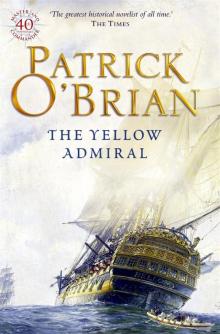 The Yellow Admiral
The Yellow Admiral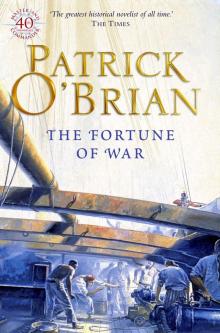 The Fortune of War
The Fortune of War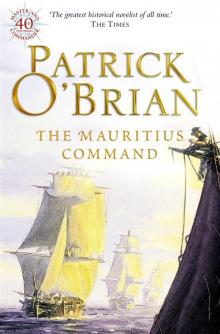 The Mauritius Command
The Mauritius Command Beasts Royal: Twelve Tales of Adventure
Beasts Royal: Twelve Tales of Adventure A Book of Voyages
A Book of Voyages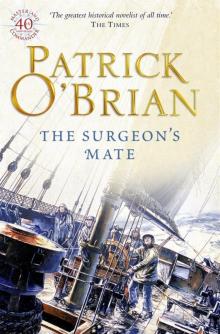 The Surgeon's Mate
The Surgeon's Mate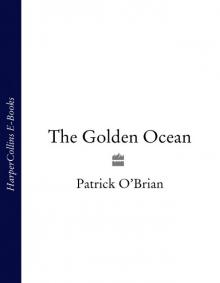 The Golden Ocean
The Golden Ocean Hussein: An Entertainment
Hussein: An Entertainment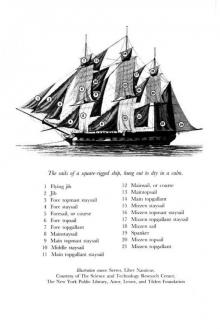 H.M.S. Surprise
H.M.S. Surprise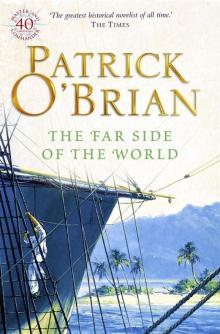 The Far Side of the World
The Far Side of the World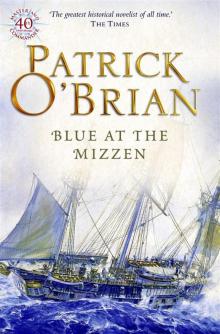 Blue at the Mizzen
Blue at the Mizzen The Unknown Shore
The Unknown Shore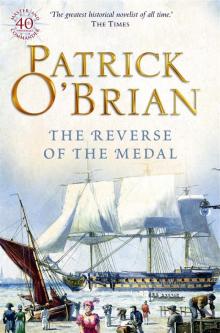 The Reverse of the Medal
The Reverse of the Medal Testimonies
Testimonies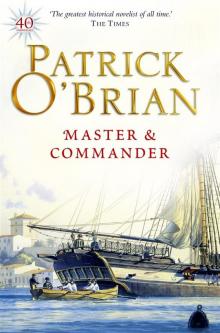 Master and Commander
Master and Commander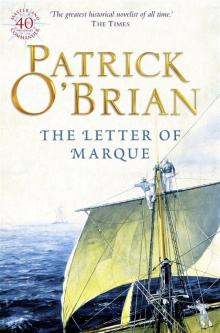 The Letter of Marque
The Letter of Marque Treason's Harbour
Treason's Harbour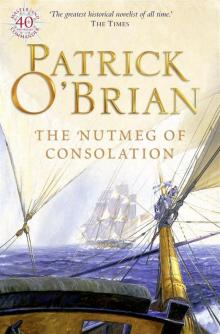 The Nutmeg of Consolation
The Nutmeg of Consolation 21: The Final Unfinished Voyage of Jack Aubrey
21: The Final Unfinished Voyage of Jack Aubrey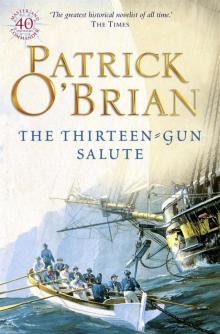 The Thirteen-Gun Salute
The Thirteen-Gun Salute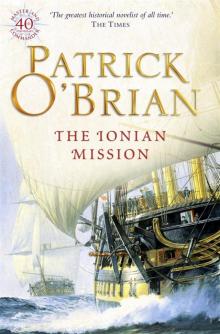 The Ionian Mission
The Ionian Mission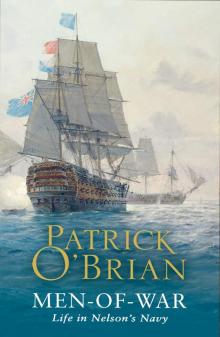 Men-of-War
Men-of-War The Commodore
The Commodore The Catalans
The Catalans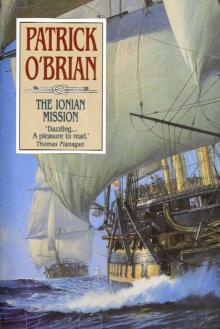 Aub-Mat 08 - The Ionian Mission
Aub-Mat 08 - The Ionian Mission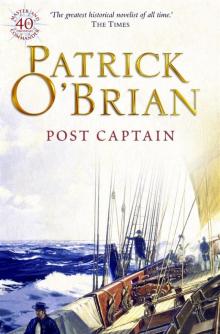 Post Captain
Post Captain The Road to Samarcand
The Road to Samarcand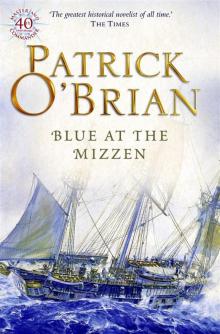 Book 20 - Blue At The Mizzen
Book 20 - Blue At The Mizzen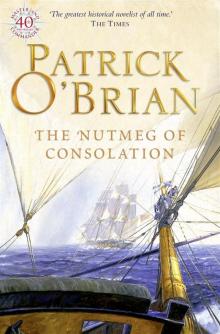 Book 14 - The Nutmeg Of Consolation
Book 14 - The Nutmeg Of Consolation Caesar
Caesar The Wine-Dark Sea
The Wine-Dark Sea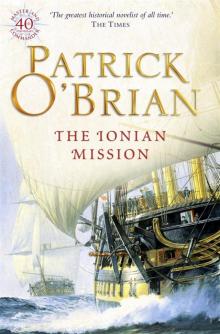 Book 8 - The Ionian Mission
Book 8 - The Ionian Mission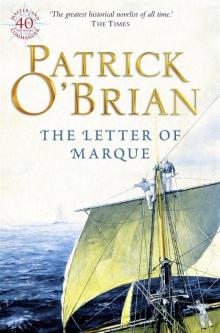 Book 12 - The Letter of Marque
Book 12 - The Letter of Marque Hussein
Hussein Book 9 - Treason's Harbour
Book 9 - Treason's Harbour Book 19 - The Hundred Days
Book 19 - The Hundred Days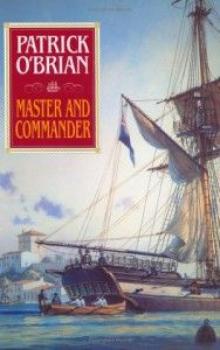 Master & Commander a-1
Master & Commander a-1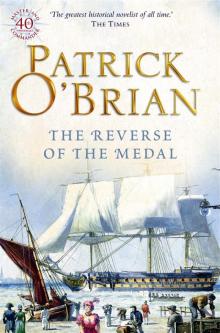 Book 11 - The Reverse Of The Medal
Book 11 - The Reverse Of The Medal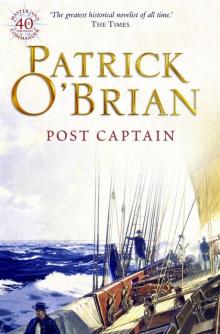 Book 2 - Post Captain
Book 2 - Post Captain The Truelove
The Truelove The Thirteen Gun Salute
The Thirteen Gun Salute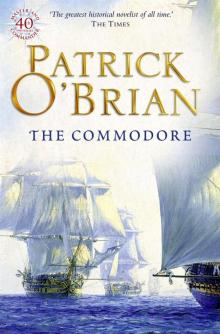 Book 17 - The Commodore
Book 17 - The Commodore The Final, Unfinished Voyage of Jack Aubrey
The Final, Unfinished Voyage of Jack Aubrey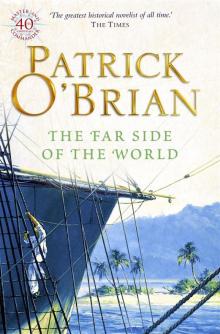 Book 10 - The Far Side Of The World
Book 10 - The Far Side Of The World Book 5 - Desolation Island
Book 5 - Desolation Island Beasts Royal
Beasts Royal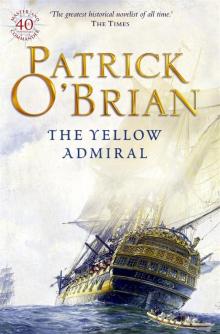 Book 18 - The Yellow Admiral
Book 18 - The Yellow Admiral Book 15 - Clarissa Oakes
Book 15 - Clarissa Oakes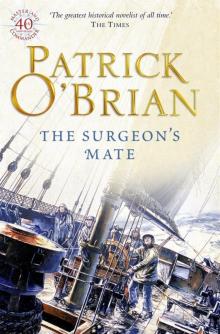 Book 7 - The Surgeon's Mate
Book 7 - The Surgeon's Mate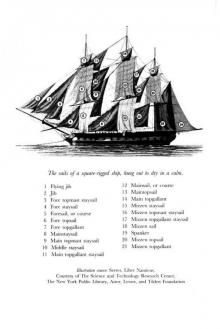 Book 3 - H.M.S. Surprise
Book 3 - H.M.S. Surprise Desolation island
Desolation island Picasso: A Biography
Picasso: A Biography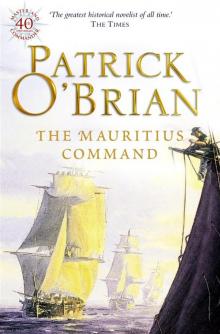 Book 4 - The Mauritius Command
Book 4 - The Mauritius Command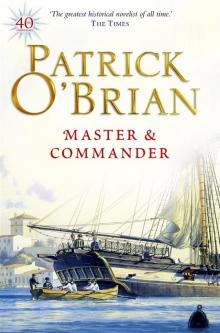 Book 1 - Master & Commander
Book 1 - Master & Commander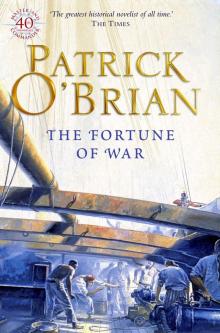 Book 6 - The Fortune Of War
Book 6 - The Fortune Of War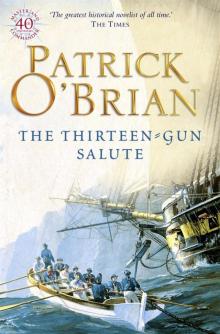 Book 13 - The Thirteen-Gun Salute
Book 13 - The Thirteen-Gun Salute Book 16 - The Wine-Dark Sea
Book 16 - The Wine-Dark Sea